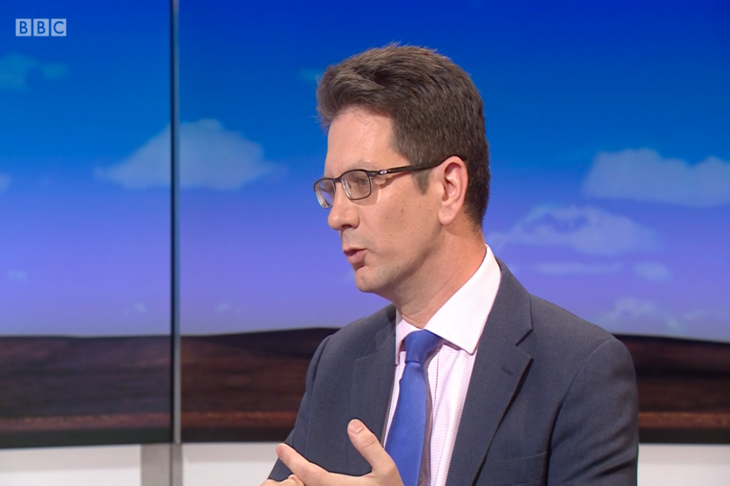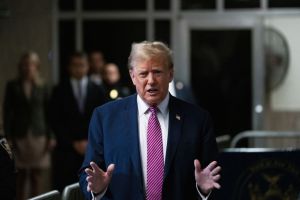In May, WWE professional wrestler Kane, whose real name is Glenn Thomas Jacobs, won the Republican primary for mayor in Knox County, Tennessee. Kane’s move into politics may seem a drastic change of career for a three-time world champion and 12-time world tag team champion who played the half-brother of the infamous Undertaker on-stage. But there are more links between the Republican Party and wrestling than you would think – and in the age of Trump, the two have become weirdly intertwined.
Vince McMahon, the chairman and CEO of WWE, is a long-time friend of President Trump, and the two even fought in the ring following a staged dispute in 2007, which ended with the president holding McMahon down on a chair and shaving his head.
In the 1980’s, Trump sponsored two Wrestlemania events, and remained somewhat involved with WWE for many years, with Vince McMahon and his wife Linda, who was appointed by Trump in 2016 as Administrator of the Small Business Administration, becoming the Trump Foundation’s biggest donors.
As an official WWE Hall of Famer, Trump is still listed on WWE’s website as a Hall of Fame superstar, and the president reaffirmed his connection to the sport last year, when he posted a GIF of himself wrestling a personified version of CNN – a post which was retweeted by WWE legend and commentator Jerry “The King” Lawler.
Other WWE superstars have also expressed support for both Trump and conservative politics in general, including Big Cass, who has reportedly been facing “heat” in the locker room over his support for Trump. Hulk Hogan, who offered his support to Trump, worked with billionaire Trump-supporter Peter Thiel to take down gossip news website Gawker, and was encouraged by former Trump adviser Roger Stone to run for Senate.
Trump, business, right-wing politics, and professional wrestlers seem to connect everywhere. Triple H and his wife Stephanie McMahon attended Trump’s 2016 presidential inauguration, while Bobby Lashley defended the president in an interview, claiming, “Everybody gives Trump an extremely bad rap.”
WWE star Randy Orton has also dipped into conservative politics, criticising those who refused to stand for the national anthem in 2016; and in 2010, Brock Lesnar criticised ObamaCare, declaring, “I’m a conservative Republican.”
Dwayne “The Rock” Johnson is no fan of Trump, of course, though he has previously supported the Republican Party, and is considering a presidential run in the future. Dolph Ziggler also floated the idea of his own presidential run, and has appeared on Fox News’ Kennedy several times, alongside guests such as Guy Benson.
Aside from President Trump’s close relationship with the McMahons, there could be other reasons why professional wrestlers feel an affinity to conservative politics and President Trump in particular. Trump’s political style is not unlike a wrestling performance.
In 2015, in Think Progress Judd Ledum pointed to French philosopher Roland Barthes’ 1957 book Mythologies as a potential explanation for Trump’s success. In Mythologies, Barthes wrote:
‘This public knows very well the distinction between wrestling and boxing; it knows that boxing is a Jansenist sport, based on a demonstration of excellence. One can bet on the outcome of a boxing-match: with wrestling, it would make no sense. A boxing- match is a story which is constructed before the eyes of the spectator; in wrestling, on the contrary, it is each moment which is intelligible, not the passage of time…The logical conclusion of the contest does not interest the wrestling-fan, while on the contrary a boxing-match always implies a science of the future. In other words, wrestling is a sum of spectacles, of which no single one is a function: each moment imposes the total knowledge of a passion which rises erect and alone, without ever extending to the crowning moment of a result.’
And as Ledum observed:
“In the current campaign, Trump is behaving like a professional wrestler while Trump’s opponents are conducting the race like a boxing match. As the rest of the field measures up their next jab, Trump decks them over the head with a metal chair,” Think Progress explained. “Others in the Republican field are concerned with the rules and constructing a strategy that, under those rules, will lead to the nomination. But Trump isn’t concerned with those things. Instead, Trump is focused on each moment and eliciting the maximum amount of passion in that moment. His supporters love it.”
“For a pro wrestler, energy is everything. A wrestling fan is less interested in what is happening — or the coherence of how one event leads to the next — than the fact that something is happening,” they continued. “On that score, Trump delivers.”
That was before Trump became president. It seems truer than ever now.


















